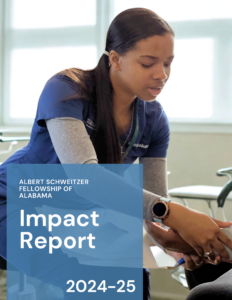October 23, 2019; By Jasmine E. Crenshaw
Jennifer (Payne) Guffin, a 2017 Fellow for Life, learned this valuable lesson after finishing her group therapy curriculum with five at-risk youth: “I learned that these at-risk youth are children who face a lot of challenges and take on responsibilities at home that the average child does not — so much so that going to school everyday is a big accomplishment.”
For her Fellowship project, she focused on strengthening the coping skills of her students through group therapy sessions and utilizing literary themes from the popular young adult novel, Harry Potter and the Sorcerer’s Stone. The results of her project were inspiring. Jennifer reported that 4 out of her 5 participants utilized a coping skill outside of the classroom, while one student was able to use a skill while in the classroom. Additionally, all 5 students achieved a behavior score of at least 80 for 2 consecutive months.
As a graduate student in the Human Sciences Department within the College of Education and Human Development at the University of Montevallo, Jennifer applied classroom theory learned about working with at-risk youth and utilizing literature in therapy sessions. She has since graduated from her program, earning her Masters in counseling and is now working with more marginalized populations in the state.
Recently, our Executive Director, Kristin Boggs, got the chance to catch up with Jennifer about how her Fellowship project informed her work experiences afterward. Here is their conversation.
Kristin Boggs (KB): Where are you living and working?
Jennifer Guffin (JG): I currently live in Montgomery, Alabama. I am a rural sexual assault counselor with the Family Sunshine Center, so technically I work in three places! I serve [in the] Montgomery, Chilton, and Butler counties. My home base is at the center here in Montgomery. However, one day of the week I am in Chilton County at Community Action and on another day of the week, I am at Safe Harbour Child Advocacy Center in Greenville, Alabama.
KB: What is your current role?
JG: My official title is Victim Services Counselor, but most people know me as a sexual assault counselor since that is my division of victim services.

KB: How (if at all) did the ASF experience influence your choice of where to practice, in terms of geography, patient population, the scope of your work, etc.? Do you use any knowledge or skills gained during your fellowship year?
JG: The ASF experience definitely equipped me to be able to work in a nonprofit setting like the Family Sunshine Center. I came into the role with an informed perspective on assessing the needs of rural populations, which has helped me as I work with my team to find creative ways to reach more people in these communities. In fact, I always remember one of the first TED talks that I watched as part of getting ready for my project, where the speaker talked about going into a foreign country to help feed people but didn’t ask the locals about the land he started working on. So in the end, he ended up feeding a bunch of hippos instead of the people! If he had asked the locals, they could have told him the land he was working on was crawling with them! Now, when I go into my counties, I try to keep an open mind and an open dialogue with the people there. They know what their needs are. I tell myself, “I’m here to feed people, not hippos!” (Metaphorically, of course.)
KB: Have you been able to use any connections you made?
JG: I would love to start using more connections for the work I’m doing now, especially since I am so close to Tuskegee University, which two of the Fellows in my term attended. I’m also open to using telehealth technology to utilize connections with other Fellows for Life (FFL) who may be able to help out in various ways, without having to leave their location!
KB: Any “next steps” that you anticipate in your current role, work or volunteer-related?
JG: Right now, my long-term goal is to add telebehavioral health to our services, which is using webcams to see clients remotely. I am currently seeking certification in telebehavioral health and am working on a proposal to launch a pilot program starting with myself to test the waters. Research is showing that this is a great way to reach people in rural counties who might have to travel over an hour to the nearest service. There’s also some awesome programs currently going on with Penn State that are utilizing telehealth to train nurses on becoming SANEs [sexual assault nurse examiners] and allowing them to guide nurses in rural hospital ERs to conduct the exam properly. This is so important because without a forensic exam (and one that’s done properly) it can be very hard to prosecute sexual assault cases. Unfortunately, there are not many nurses trained as SANEs, and they are even less likely to be found in rural communities.
KB: Any advice for current Fellows or prospective students?
JG: My advice would be to put yourself out there. One of the main things I have heard from students about why they hesitate to apply is because they are afraid that they wouldn’t have the time or that they wouldn’t know what project to do. Many times, I hear the underlying message of, “I’m afraid that I’ll fail.” One of the great things about the Fellowship is the support you receive from your leaders and from other Fellows throughout the process, so you are never alone in it. I would also challenge anyone considering applying to consider that there will always be reasons not to seize an opportunity. Leaders, innovators, and world-changers are simply regular people who decided to take the leap of faith. You can do this. You just have to decide that you’re willing.



